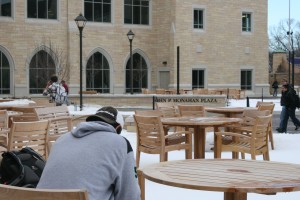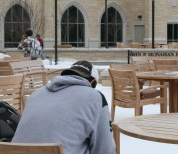After a two-year legislative process, the St. Paul City Council approved St. Thomas’ liquor license request for the St. Paul campus Wednesday, Jan. 25.

The license takes effect later this week, and the university will be allowed to serve liquor in 15 indoor locations and three outdoor locations at reunions, wedding receptions and other events.
Doug Hennes, vice president of university and government relations, said that the university will save money now that it does not have to use outside vendors for events involving alcohol sales.
“Bottom line is we’re going to save money,” Hennes said. “It’s more expensive to use (outside vendors) than it is to do it ourselves because they’re a full-profit company.”
Even though the license will cost $5,700 a year, Hennes said that by handling the liquor themselves, the university will “save more than the actual cost of the license.”
Sophomore Anna Wright said that the license will be convenient for the university when putting on events.
“I think it’s a great opportunity for St. Thomas to have control over it because that way it can be a lot easier for them to do fun organizations for the alumni and people of age,” Wright said.
Hennes said that the liquor license will also be efficient for events because the food service staff will be able to serve the liquor.
“We’re essentially eliminating the middle man,” Hennes said. “It’s our responsibility now.”
Neighborhood concerns
Although the West Summit Neighborhood Advisory Committee supports indoor alcohol sales, some neighbors and WSNAC members are concerned that the outdoor alcohol sales will add to the possibility of noise and disruption in the surrounding neighborhoods.
“It’s usually in those situations that people tend to be a little noisier and less mindful of the fact that they may be parked in a neighborhood or walking through a neighborhood,” Scott Banas, WSNAC co-chair, said.
Another WSNAC concern was that the university was not modeling good behavior to its underage student population by selling alcohol on campus.
Because of these concerns, WSNAC wanted to restrict the university to serving liquor in one location, one time a year: the John P. Monahan Plaza on homecoming.
The university did not agree.
“We said that wasn’t acceptable,” Hennes said. “We wanted multiple locations with unlimited number of occurrences. A point that we made there was we don’t expect to have an outdoor event more (than) once a week throughout the entire year where we’d be selling alcohol.”
Hennes said that the university experimented with the outdoor liquor sales last fall during football season with the Purple on the Plaza event.
“It was low-key,” Hennes said. “Nobody got drunk, nobody made a spectacle of themselves. It was all adults, not a bunch of kids trying to sneak beers. It was very tightly regulated.”
Banas said that it is important to understand why WSNAC is concerned about outdoor alcohol sales.
“The primary reason WSNAC objected is for the health and welfare concerns for students,” Banas said.
The dispute prompted three public hearings last fall, and the city eventually asked the university to list all the specific locations on St. Paul campus where alcohol would be sold.
The university’s original list consisted of 15 indoor locations and nine outdoor locations. The city approved all indoor locations but asked the university to limit its liquor sales to three outdoor locations within the first year.
The university narrowed down its outdoor locations to Monahan Plaza, the Lower and Upper Quads and the McNeely Hall courtyard.
Hennes said that the restriction to three locations within the first year “will easily meet (the school’s) needs.”
“Virtually anything we’re going to do outside is going to be connected to (Anderson Student Center),” Hennes said. “It’s perfectly set up.”
As part of the license’s conditions, an annual review is required to assess how the university is progressing within the terms of the license. The university will be able to add more outdoor locations if the license is successful and the university is complying with the conditions.
The city’s conditions also included an agreement that the university will not hold a permanent bar on campus.
“We’re going to be even more responsible when we’re handling (the liquor) ourselves, and the city agreed with that,” Hennes said.
Briggs LeSavage can be reached at lesa4364@stthomas.edu


Good story.